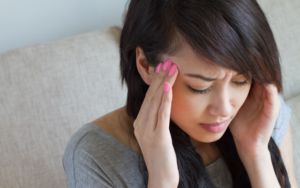Menieres Disease is an inner ear disorder that affects a person’s hearing & balance. Its symptoms include a feeling of pressure in the ears, a ringing in the ears(tinnitus), feeling disoriented, unbalanced, dizziness, & Vertigo. Patients also experience motion sickness, nausea, & vomiting, along with usual vertigo symptoms. If you have a persistent ringing sound in the ears, experience hearing loss in one of your ears, &/or dizziness or balance problems, then you likely have Meniere’s Disease.
Meniere’s Disease causes:
So far, there is no exact known Menieres Disease cause. Most medical experts believe that it is caused by a rise in the fluid levels of the inner ear, leading to abnormal changes in the inner ear pressure.
Some probable Meniere’s Disease causes include:
- Head injury
- Any infections or injury in the inner or the middle ear
- Allergies
- Excessive alcohol usage
- Stress
- Side effects of certain medications
- Smoking
- Anxiety & panic attacks
- Excessive fatigue or chronic tiredness
- Family history of the disease
- Respiratory problems
- Any recent viral illnesses
- An abnormal immune response
- Migraine headaches
Meniere’s Disease symptoms:
It’s normal for Meniere’s Disease patients to experience a variety of symptoms, including:
- Feeling increased pressure in the ears
- Sudden onset of dizziness
- Tinnitus, or a ringing sound in the ears
- Weak hearing or partial hearing loss in one of the ears
More to Read :How CBD Will Help You Sleep and Get Rid of Insomnia
These symptoms can vary from individual to individual. Some people may experience recurrent, frequent attacks, while others may experience only short spells of the attacks. The intensity of these symptoms also differs from person to person, with some people experiencing severe symptoms that make them unable to carry out everyday activities, & some others getting only mild symptoms.

Your doctor will make an accurate diagnosis based on your exact symptoms, your medical history, & the intensity of your condition. More precisely, your doctor will only give you a Meniere’s Disease diagnosis if you experience recurrent hearing loss, ringing in the ears, & dizziness. In some cases, Meniere’s Disease patients also report experiencing diplacusis, known as “double hearing.” Menieres Disease symptoms first begin with a feeling of pressure in the ears, followed by tinnitus or a ringing in the ears, hearing loss, & vertigo symptoms.
These attacks can last anywhere from 20 minutes to a few hours.
Meniere’s Disease stages & diagnosis:
Meniere’s Disease affects every individual differently, with a range of symptoms. These stages of Meniere’s Disease are:
-
Early Stage:
In this stage, patients experience a sudden onset of dizziness & vertigo that lasts up to 20 minutes to a few hours. Their ears can also feel full, or they may experience a certain amount of pressure inside their ears. They may also experience mild hearing loss, & ringing inside the ears.
- Middle Stage:
In this stage, some Meniere’s Disease symptoms tend to get less severe, but tinnitus & hearing loss might become prominent. Some people might also experience a long remission period, where the symptoms just disappear for a long stretch of time.
- Late stage:
In this stage, patients are not likely to experience vertigo as often, & some patients might stop experiencing vertigo at all. Tinnitus & hearing loss, on the other hand, continues to worsen & starts interfering with patients’ everyday lives. Patients may also get dizzy & experience loss of balance more often, & may not feel stable enough in dark, dingy conditions.
More to Read : 10 Best & quick Weight Lose Tips for Men
One of the primary reasons for the delay in Meniere’s Disease treatment is the lack of effective diagnosis. Since Meniere’s Disease symptoms resemble those of many other vestibular illnesses, it sometimes takes upto several months & various diagnostic tests to arrive at a Meniere’s Disease diagnosis.

Meniere’s Disease treatment:
Meniere’s Disease treatment usually consists of a few home remedies, coupled with some lifestyle changes in the initial stages of the treatment.
These home remedies & dietary changes include:
- Reducing salt intake: Salt causes abnormal levels of fluid to build up in the ear, leading to increasing the severity of Meniere’s Disease symptoms. Thus, in the initial stages of Meniere’s Disease treatment, doctors recommend patients reduce or limit their daily salt intake.
- Reducing caffeine: Caffeine is also responsible for aggravating patients’ vertigo & dizziness symptoms, along with hearing loss & tinnitus. Thus reducing caffeine intake would be a logical thing to do for Meniere’s Disease treatment.
Other lifestyle changes involve stopping smoking, & reducing stress through meditation & other activities.
Medical treatment for Meniere’s Disease:
There are currently very few medical treatments for Meniere’s Disease. As the condition seems to develop due to no known cause, it is difficult to treat it based on the symptoms themselves. In most cases, treatment focuses on relieving the symptoms rather than treating the actual cause of the disease itself.
Medical treatments for Meniere’s Disease include:
- Inner ear injections: Inner ear injections of gentamycin, which is an antibiotic to reduce dizziness, is given to the patient. This process is also known as chemical ablation. This process works but is known to increase the risk of hearing loss.
- Inner ear injections of steroids: Steroids are also given to patients to help reduce the inflammation in the inner ear. Studies have shown this line of treatment to actually be effective.
Other Menieres Disease treatment options include:
- Anti-Dizziness medications like antihistamines, benzodiazepines, & anticholergenics
- Diuretics, also called water pills, to reduce the amount of fluid inside the ear.
- Surgery to reduce the amount of fluid & pressure inside the ears
Cochlear Menieres Disease:
Cochlear Meniere’s Disease was once considered a variant of classic Ménière’s disease involving every Meniere’s Disease symptom except vertigo. In recent years, a certain Transtympanic electrocochleography (TT ECoG) has emerged as a useful tool for electrophysiologic monitoring of the inner ear and is especially valuable in assessing endolymphatic hydrops.

A decision is then reached based on the exact results of the test, the patient’s medical history, acute representation of their symptoms, & comparison with already available data on cochlear Menieres Disease in previous patients.
